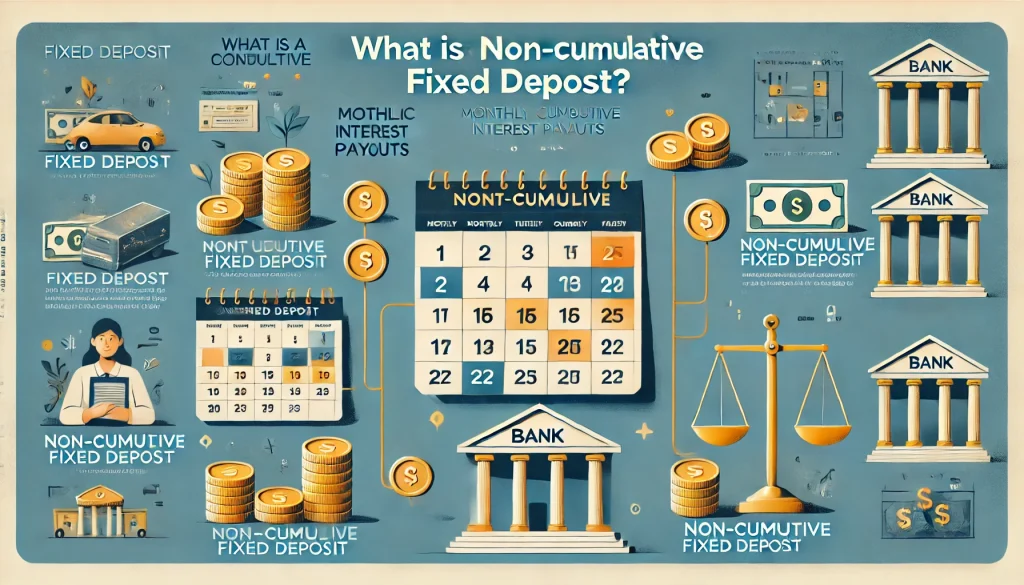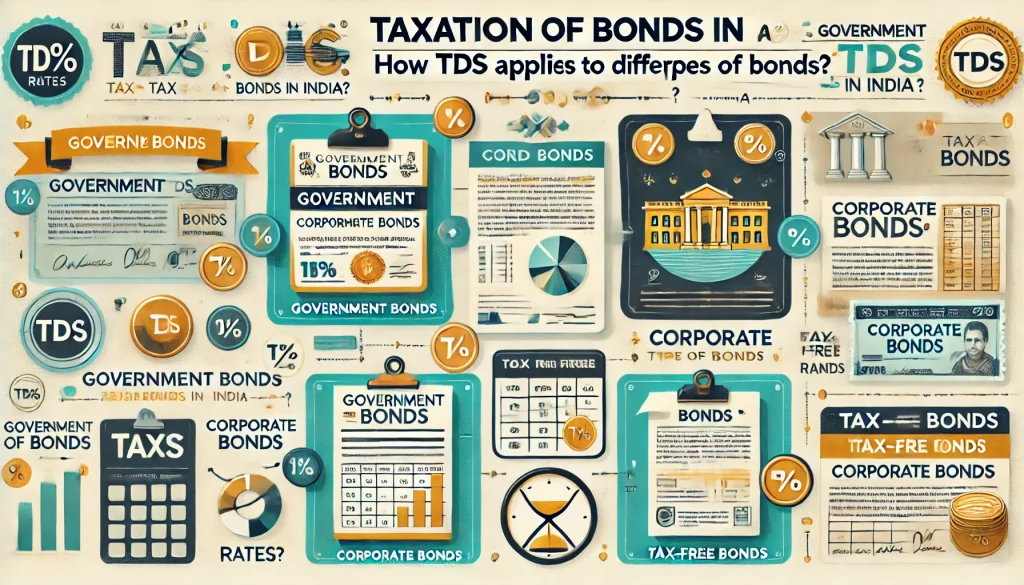
When you think of investing your money in a safe and reliable investment option, the two most popular choices that are considered are fixed deposits (FD) and bonds. Both these investment tools offer stable returns on deposits and are preferred by depositors looking for low-risk investment plans. However, bonds and FDs are different from each other, with certain distinctive features and benefits. Let us dive deeper into the details of bonds vs fixed deposits, the benefits of each investment tool, and the most suitable option for you to choose.
What are Bonds?
Bonds refer to a kind of financial or debt instrument that governments or organisations use to raise funds to use in new projects, ongoing projects, new acquisitions or expanding business. Issuers of bonds borrow money from different investors for a specific period in exchange for a certain payment of interest.
The payment of interest is made either annually, quarterly or monthly. After the end of the maturity period, the investor is repaid the principal amount along with the interest. The rate of interest applicable on bonds can be floating or fixed, based on the preference of the depositor.
Bonds are considered to have lower risk than investing money in equities. This aspect makes bonds crucial if you want a diversified investment portfolio. Bond risks are generally related to interest rate fluctuations, credit, and inflation risks.
What are Fixed Deposits?
Fixed deposits, also known as term deposits, are a secure investment option where you fix a certain amount of your money for a fixed tenure at an attractive interest rate. This is a safe investment option offered by banks and NBFCs for conservative depositors who want a fixed earning at regular intervals.
Investing in FDs is ideal for senior citizens or retirees. This is because you get a fixed income in terms of interest on the fixed deposit. Moreover, senior citizens benefit from higher interest rates on the FDs, making it a suitable choice to save and grow your money for future goals.
With fixed deposits, you get the advantage of premature withdrawal or loan against them. You can prematurely withdraw your FD against a penalty charge if you have a financial emergency. Banks or NBFCs also allow you to take loans against your FD based on specific terms and conditions. Investing in FDs can be your best friend to fulfil your long-term financial plans.
Bonds vs Fixed Deposits – Difference
Even though both fixed deposits and bonds share some similar characteristics, there are significant points of difference between them. Below is a tabular presentation of bonds vs fixed deposits to give you an idea of how they differ.
| Category | Fixed Deposits | Bonds |
|---|---|---|
| Definition | It is a financial tool investors use to deposit a sum for a fixed tenure with a predetermined interest rate. Here, the borrower agrees to pay back the money with a predetermined rate of interest. | It is a debt instrument used by governments and organisations to raise money to fund business operations |
| Return | Returns on fixed deposits are fixed in terms of the principal amount invested and the interest applicable to the sum. | Higher returns are generally expected when money is deposited in bonds. |
| Issuer | Banks, post offices and different non-banking financial companies issue fixed deposits for different types of customers. | Bonds are mainly issued by central or state governments, municipalities, PSUs (Public Sector Undertakings) and private organisations. |
| Accessibility | FDs are easy to access. You can easily and instantly book a fixed deposit account with any financial institution. | You cannot easily access investment in blinds. You have to buy bonds over the counter, which often makes it difficult for retail investors to deposit their money in this financial instrument. |
| Maturity | There is a fixed maturity period for FDs. It can range from a few days to months to almost 10 years. | The maturity period for bonds can range from a few months to several years. |
| Payout Frequency | Investors of FDs get the option to choose their interest pay-out frequency on their investment. | As an investor of bonds, you cannot choose the frequency of interest payout. It can vary from yearly to half-yearly to cumulative payment during maturity. |
| Credit Ratings | FD investment via NBFCs must have mandatory credit ratings. This shows how stable the returns are of that organisation. However, FDs by banks and post offices do not require any credit ratings. | Bond issuers have to compulsorily get their bonds rated by well-known credit rating agencies, such as CRISIL, CARE or ICRA. |
| Tax Implications | Income from fixed deposits is taxable as per the individual’s income tax slab. TDS deductions are also applicable at 10% if income on interest exceeds ₹40,000 and ₹50,000 for general and senior citizens, respectively. | Capital gains derived from bonds are taxed according to their holding period. Governments also issue tax-free bonds that can help you save taxes on your investment. |
| Liquidity | FDs are less liquid as the amount is held until the maturity period, except for emergencies. | Bonds are highly liquid in nature, suggesting they can be bought and sold on the market whenever the investor wants. |
Benefits of Investing in Bonds
Understanding bonds vs FDs will remain incomplete if we do not have an idea of their advantages. Let us start with the benefits of investing in bonds. Check the below pointers to get a clear idea regarding the benefits.
- Bonds provide a consistent and predictable revenue source in the form of interest payments. This is especially advantageous for people wanting a steady source of income, such as retirees.
- Bonds allow you to diversify your investment portfolio. Adding bonds to your portfolio can reduce risk and balance the potential for higher returns from riskier assets like stocks.
- Government bonds in India, like Sovereign Gold Bonds (SGBs) and National Savings Certificates (NSCs), are considered among the safest investment options. They are backed by the Indian government, ensuring the safety of your principal amount.
- Certain bonds, such as tax-saving bonds and municipal bonds, offer tax benefits to Indian investors. Interest income from specific bonds may be tax-exempt or offer deductions under Section 80C of the Income Tax Act.
- Investing in bonds often incurs lower transaction costs compared to other financial instruments like stocks. This can lead to higher net returns on your investment.
- While bonds are typically considered long-term investments, they offer liquidity through secondary markets. You can sell bonds before maturity if you need cash.
Benefits of Investing in Fixed Deposits
Apart from understanding FD vs bonds, you need to have an idea regarding the benefits of investing in fixed deposits so you can decide which is a better option for you.
- One of the safest investment options in India is said to be fixed deposits. They are supported by DICGC, which protects your principal by offering insurance of up to Rs. 5 lakh per bank per depositor.
- Fixed-rate deposits offer predictable returns since you can plan your interest payments in advance because the interest rate is established for the duration of the investment.
- FDs provide a steady and predictable income stream for persons who need investment income to support their needs, such as seniors.
- Some fixed deposits in India, such as tax-saving FDs, provide tax benefits under Section 80C of the Income Tax Act, allowing you to reduce your taxable income.
- Banks in India provide a variety of fixed deposit tenures ranging from 7 days to 10 years. This adaptability allows you to match your investment to your unique financial goals and liquidity requirements.
- In times of need, you can avail of a loan against your FD, which can be a cost-effective way to meet urgent financial requirements without breaking your deposit.
FD vs Bonds – Which is Better?
In the battle of bonds vs FDs, there has to be one financial instrument that wins and provides the maximum benefit to investors. Well, even though fixed deposits are a great investment tool, they offer a fixed income at the end of the maturity period. This is where bonds win the battle.
Here are the reasons why investing in bonds is better than investing in fixed deposits.
1. High Returns
When comparing bonds to fixed deposits (FDs), it is clear that bonds provide greater yields. FDs have a set interest rate, whereas bonds have variable yields based on issuer credit ratings and market conditions. Bonds often offer higher rates than FDs, making them an appealing option for investors looking to maximise their investment profits.
2. Liquidity
Bonds outperform fixed deposits in terms of liquidity. While FDs have set maturities and early withdrawal penalties, bonds can be sold in the secondary market if funds are needed before the bond matures. Bonds become a more adaptive investment option when their liquidity improves.
3. Diversification
Diversification is a significant advantage of bonds vs fixed deposits. Bond investments allow for the deployment of capital among a variety of securities with varying maturities, industrial sectors, and credit ratings. This power of diversification efficiently spreads risk, lowering the total investment risk profile.
Conclusion
In the bond vs fixed deposits debate, there’s no one-size-fits-all answer. Your decision to invest in bonds or FDs must depend on your current financial suitability and future goals. Bonds will suit the most if you aim for higher returns by diversifying your investment portfolio. However, in case of safe and predictable returns, a fixed deposit is your friend.
FAQs
Bonds are safe investment instruments offering substantially high returns after maturity. However, due to fluctuations in the market, the interest may be affected, making it risky at times.
There can be a chance of losing money in bonds due to market fluctuations. However, you get assured returns with fixed deposits as the rate of interest is fixed.
Both are equally favoured when investing money for long periods
Yes. You can sell your bonds in the market before maturity, but the value may fluctuate as per the present market situation.
Income from both FDs and bonds is taxable as per laws of the Indian Income Tax Act. Investors should understand the tax implications before coming up with an investment strategy.
In the case of bonds, the minimum investment amount is typically ₹1,000, while the minimum amount for some bank and post office FDs starts at ₹100.
Disclaimer
This article is solely for educational purposes. Stable Money doesn't take any responsibility for the information or claims made in the blog.


